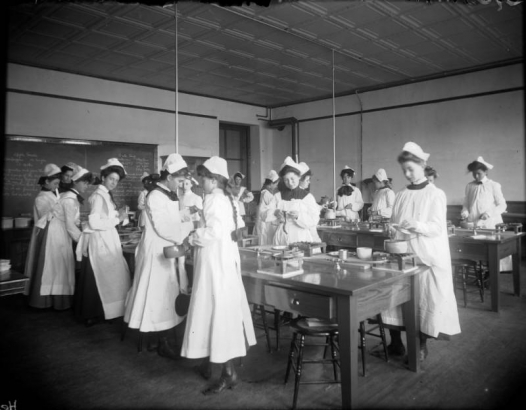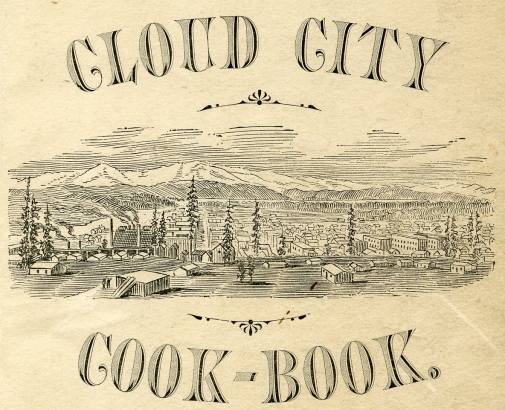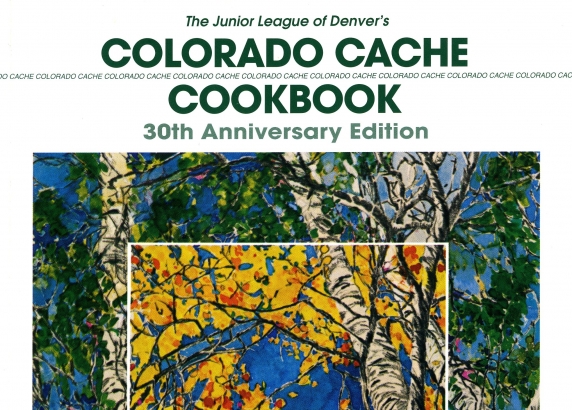Before today’s booming industry of celebrity cookbooks and food bloggers, there was a cottage industry of “community cookbooks” published by and for local communities to support local causes. In the United States, these amateur cookbooks got their start with a book published by women during the Civil War to raise money for injured soldiers. The idea spread to churches, schools and volunteer organizations. For over a century, community cookbooks have proved a surprisingly steadfast way for people (mostly women) to use their prowess in the kitchen to help others.
One of the earliest cookbooks in the Western History and Genealogy Department is Cloud City Cook-book, published by the women of the local Leadville Congregational church in 1889. Early community cookbooks are noteworthy for the sparseness of their recipes, in both ingredients and instruction. They assume that readers already know rudiments of cooking (as most proper 19th century wives would) and the ladies of Leadville have some of the shortest recipes I have ever seen. One of my favorites is their 16-word recipe for macaroni soup: “One gallon soup stock, five sticks macaroni, one onion. Season with salt and pepper. Boil well.” Sounds easy and perfect for a head cold.
Community cookbooks encapsulate a specific community in place and time. Cloud City Cook-book was compiled to help incoming wives cope with the challenges of cooking at altitude. I certainly hope no one today needs the authors’ admonishment that “the husband who has recently brought his wife from the East, is not in healthy employment when he reminds her of the superior quality of his mother’s cooking. He must wait until she has learned the new conditions in her new world.”
If we move forward in time, our most recent community cookbook is Colorado Cache: A Goldmine of Recipes from the Junior League of Denver, published in 2008. Boy, have times changed. While there are still plenty of low-budget local cookbooks, this one is the fifth edition of a national bestseller, making it a sort of hybrid community cookbook. It is also definitely for the modern cook, from the detailed instructions to the special section on “Microwave Cooking.” Yet, the recipes are still compiled from amateur cooks and include some local touches, such as dessert-making tips from Sugar City (I certainly hope with pun intended). Despite the national readership, the recipes are for Denver’s altitude, with suggestions for converting to higher or lower altitudes. You can take the recipes out of Denver, but it is much harder to take Denver out of the recipes.
If you’re looking for more community cookbooks, Western History and Genealogy has a growing array from local schools, churches, organizations, and even your very own Denver Public Library. Two cookbooks from First Baptist Church are also digitized and available online: 300 Choice Recipes (1892) and How We Cook in Colorado: Choice Recipes (1907). How about you? Have you ever used or contributed to a cookbook in your community?




Comments
I follow the philosophy, of
I follow the philosophy, of -what do you do when you want something good to eat ? Answer-Eat out.
Thanks for commenting! Eating
Thanks for commenting! Eating out is always a good option, and it's much more convenient now than in the 19th century.
I love cookbooks, those by
I love cookbooks, those by community groups the best. Recently I've been searching 'vintage cookbook' on Pinterest and have found a wealth of digitized cookbooks from collections around the country.
Thanks for the note, Lori!
Thanks for the note, Lori!
We have a quick question.
We have a quick question. What is a stick of macaroni and what is the modern equivalent of that?
Thanks for your question
Thanks for your question Kaitlin and Jessica! I'm not completely sure what a stick of macaroni would translate to today. In past centuries, macaroni was often a substitute term for all pasta (like coke is in certain parts of the country). Also, there are long versions of macaroni available and are typically used in "maccheroni" dishes such as maccheroni alla chitarra. If you are looking for a substitute and don't want to pick up a bag of long macaroni, I am sure any other type of pasta would work. One great benefit of these bare-bones recipes is how they lend themselves to personal adaptation.
I LOVE community cookbooks.
I LOVE community cookbooks. My mom bought them, so I used them as a kid. Now, I have to stop myself from buying them at garage sales. They're fascinating & at times disgusting. But I do like the recipes from a Greek Orthodox church cookbook I own.
Thanks for commenting, Cherie
Thanks for commenting, Cherie. You never know what you're going to get, but these cookbooks can be real treasure troves, as you've found with your Greek Orthodox church cookbook!
Haven't heard of community
Haven't heard of community cookbooks, let alone read one. The evolution of cookbooks has totally transformed the way recipes are shared. But, the cause involved in community cookbooks is commendable.
http://varalakshmisago.com/south-indian-papad/
Thanks for commenting!
Thanks for commenting!
Add new comment